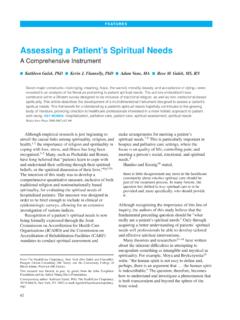Transcription of Integration of Christian Faith and Social Work Practice
1 Integration of Christian Faith and Social work Practice belhaven university Tenure Paper Angela Gaddis PhD LCSW Associate Professor 9/15/2011 Introduction As I think about the academic topics to be addressed in this paper, I feel compelled to begin with my personal reflections of this journey of combining my calling to the Social work profession with my Christian Faith . As a Christian young adult I knew I wanted to dedicate my life to helping others, though not entirely sure through what means or what the notion of helping even looked like. Growing up in a Christian home and attending church on a regular basis, to help others was not only taught it was expected. It was defined many different ways to help my grandmother with her yard work ; to help the elderly neighbor next door; to help the stranger on the street by donating to the local shelter; to help missionaries by sending them money I saved throughout the year.
2 Each of these and various other deeds were instilled in me at a young age on the philosophical basis of loving others as Christ loved and but for the grace of God there go I. How would I pursue developing this passion and desire of helping into a lifelong career? As a high school and college student, opportunities presented themselves academically and experientially which led me to choose Social work as the avenue of fulfilling this calling. During the course of my studies and spiritual growth, I soon recognized there were many suppositions in Social work which were congruent with my personal Faith and Christian worldview; however, others existed which caused me to grapple with balancing my Faith and my profession. I continued to be faced with challenges during my Practice , but there were repeated opportunities for learning and growth as not only a Social worker but as a Christian who also happens to be a Social worker.
3 As I now prepare students to enter into the Social work profession, I feel convicted that it is my job to challenge them in a classroom, which is emotionally and spiritually safe. The goal is for them to struggle with their own worldviews and how to integrate them into a profession which has in recent years begun to pull away from its acknowledgement of the impact that the Christian Faith has had on its development. This means that I must do more than simply insert scripture into a syllabus. I must attempt to make my students analyze and critically think about issues which are often controversial and help them to develop their stances through scripture by presenting them with both secular and biblical presuppositions. It is my responsibility to challenge them to explore how their worldviews, Christian or otherwise, are involved in the process of Social work Practice when they are in positions of deciding what to do, when to do it, how to do it, and why do it.
4 This paper will attempt to communicate what I have come to understand through my own journey as an Integration of Christian Faith and Social work Practice as well as the foundation on which I construct my classroom experience. Philosophical Presuppositions of Current Scholarship in Social work The Social work profession historically based much of its language and premises for Practice on the foundations of the Christian church, one of the first originators of this notion of helping others. Additionally, Christian spirituality laid the foundation for the establishment of moral and Social justice in both religious and secular institutions. However, during the past 50 years, the Social work profession diluted the influence of the church on the profession and has ventured toward the notion that neither institutional nor ideological religion has a place in informing Social work Practice (Hugen, 1998).
5 It has been consumed with presenting itself as a scientific profession supported by quantitative empirical data, not only philosophical assumptions. Research has also shown a reluctance to incorporate spiritually related issues into Social work education (Derezotes & Evans, 1995). This hesitancy, compounded by the profession s recent stance, has led to a dominant secular worldview in Social work education and Practice . Though there is extensive agreement that Social work has a religious foundation (Neibuhr, 1932; Marty, 1980; Keith-Lucas, 1989), it is obvious that Social work also promotes a positivist worldview and devalues spirituality and religion. In the early twentieth century, logic and empirical evidence were embraced in the Social sciences as superior influences to the profession.
6 Secular theorists such as Karl Marx, Emile Durkheim, and Sigmund Freud greatly impacted the development of Social work theory. Each of these Social scientists viewed religion with hesitancy and doubt (Ressler, 1998). Marx viewed religion as oppressive, while Durkheim s opinion was that it was a segment of Social construction functioning strictly as a societal institution. Freud s explanation was that it was a neurotic impulse. The influence of these theorists redirected the focus of Social work from compassion and caring to Social diagnosis. This s ecularization of the profession, the idea that religion had no place informing the profession has been very extensive (Hugen, 1998). The profession has at times been hostile toward persons and institutions that profess a Christian orientation to Practice .
7 According to Cnaan (1997), the topic of religion and spirituality has been largely ignored in Social work circles over the past 50 years. Clark (1994), a Social work researcher and educator, argued that if Social workers wanted the profession to maintain its political and technological gains then Social workers must not move religion to a position of central importance. An increased attention to the topic would place Social workers on a slippery slope. This pervasive attitude has created a segment of Social workers who advocate a form of professional tyranny with the notion that there is one correct Social work worldview and one set of values in Social work that all must agree with (Ressler, 1998). They believe that Social workers who do not agree with this worldview should not be allowed to Practice as professionals.
8 This secular approach has underpinnings of postmodern values emphasizing each person s right to determine a belief and value system with no acknowledgement of a larger story which makes sense of a personal story (Sherwood, 1998). Social workers stress values such as the dignity and worth of each individual and the right to self determination; however, many deny the basis on which such a value ultimately stands. Elton Trueblood (1963) referred to this as a cut-flower approach. He explained that it is possible to cut a rose from the bush, put it in a vase, and admire its fresh beauty for a while. It is also possible to maintain the dignity and value of every human life while denying the existence or significance of God as the source of that value. But the cut rose is already dead, regardless of the beauty which lingers for awhile.
9 Even uncut, the grass withers, and the flower fades, but the Word of God endures forever (I Peter1:24-25). Social workers are taught to encourage individuals to value themselves and their capacities to become self-aware, anticipate, plan, choose and act as individuals. The notion that this right is a gift from God, the Creator, and has divine purpose is not incorporated into most Social work programs nor acknowledged in the professional code of ethics. To abandon any idea of spiritual basis for these values can dangerously lead to empty motivation for moral obligations (Sherwood, 1998). Relevant Biblical Presuppositions in Social work Does Christian belief have any place in the field of Social work ? Apart from the historical influence of the Christian Faith on the development of Social welfare, there are timeless presuppositions which guide Christian Social workers in their professions, many of which parallel with the National Association of Social Workers (NASW) Code of Ethics.
10 The value of service is stated as, Social workers primary goal is to help people in need and to address Social problems (NASW, 1999). For Christians, this resonates of Jesus teaching when he says, Whoever wishes to be great among you must be your servant, and whoever wishes to be first among you must be your slave, just as the Son of Man came not be served but to serve, and to give his life a ransom for many (Matthew 20:26-28). Both Social work and Christianity value service to others. Social justice is the second Social work value. The ethical principle is stated, Social workers challenge Social injustice (NASW, 1999). Social justice is emphasized in both the Old and New Testaments. Jesus broke Social barriers and gender discrimination when he spoke freely with the woman of Samaria.










